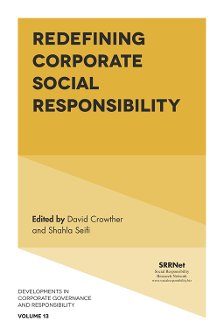
Index
Redefining Corporate Social Responsibility
ISBN: 978-1-78756-162-5, eISBN: 978-1-78756-161-8
ISSN: 2043-0523
Publication date: 3 September 2018
Citation
(2018), "Index", Redefining Corporate Social Responsibility (Developments in Corporate Governance and Responsibility, Vol. 13), Emerald Publishing Limited, Leeds, pp. 235-244. https://doi.org/10.1108/S2043-052320180000013016
Publisher
:Emerald Publishing Limited
Copyright © 2018 Emerald Publishing Limited
INDEX
- Prelims
- The Need to Reconsider CSR
- Part I Comprehensive Analysis
- Can a Values Reframing of ISO14001:2015 Finally Give Business an Effective Tool to Tackle Climate Change?
- Rethinking Corporate Social Responsibility in Capitalist Neoliberal Times
- Adoption of Integrated Reporting – An Attempt to Reduce the Gaps between CSR Discourse and Its Implementation
- “Pouring Politics down Our Throats”: Political CSR Communication and Consumer Catharsis
- The Life and Death of Corporate Social Responsibility
- Part II Pragmatic Approaches
- Archaeology and the Symbols of Socially Responsible Communication
- Traditional Artisans as Stakeholders in CSR: A Rehabilitation Perspective in the Indian Context
- Reinventing CSR in Nigeria: Understanding Its Meaning and Theories for Effective Application in the Industry
- How Managers Perceive Internal Corporate Social Responsibility: An Empirical Study of Indonesian Women’s Employment
- The Influence of Corporate Governance and Human Governance towards Corporate Financial Crime: A Conceptual Paper
- To Blow the Whistle or Not: The Roles of Perceived Organizational Retaliation and Upward Communication Satisfaction in Employee Responses to Observed Wrongdoing
- Index